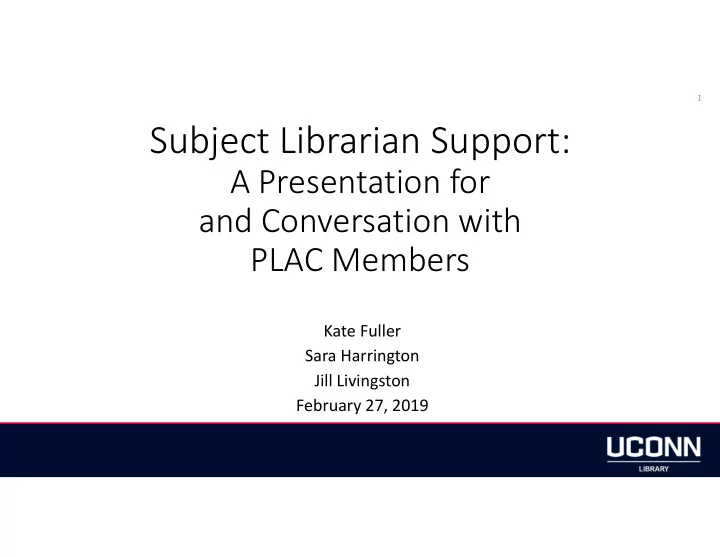

1 Subject Librarian Support: A Presentation for and Conversation with PLAC Members Kate Fuller Sara Harrington Jill Livingston February 27, 2019
2 Presenters • Kate Fuller, Head, Reference and Curriculum Services • Sara Harrington, Associate University Librarian for Academic Engagement • Jill Livingston, Head, Research Services
3 The Role of UConn Library The UConn Library exists to serve the needs of students, faculty, staff, and researchers in their scholarly, academic, and research work. The library does this in three primary areas: • By providing access to a wide variety of information resources necessary for academic research and teaching; • By providing the spaces necessary to hold the resources and the staff, and by extension providing a space, primarily for students, to interact with and synthesize information; • By providing critical instruction and guidance in the skills students and scholars need to efficiently and effectively find, organize, and manage information. • Definition by Dean Anne Langley, UConn Library
4 Opening the Conversation • We want to become the right library for UConn • To do that we want to continue to learn about the work of students and faculty, and how subject librarians can efficiently and effectively support that work • The coming year is a year of reflection for the library; we will be reaching out to engage you and your departments in conversation
5 The UConn Library exists to support teaching, learning, and research • Here are examples of what subject librarians do: • Building collections of books, databases, journals, and other resources in online and print format • Offering reference assistance, such as live chat services • Meeting with students and faculty in research consultations about student assignments, theses and dissertation, faculty research, etc. • Creating online guides in subject or theme areas • Teach workshops on specific topics such as plagiarism or research data management
6 Subject librarian services, continued • Coming to your class or offering an instructional session in the library about information literacy, helping with citation management tools, etc. • Co‐teaching and other collaborations such as supervising undergraduate internships, co‐authorship of systematic reviews, research data management consultations, etc. • Supporting new modes of scholarly communication and scholarly publishing such as collaborating on digital projects, working together on open educational resources like textbooks, offering digital repositories for openly available scholarship
7 A Changing Information Landscape • Information needs are changing due to the amount of information available and transformations in scholarly practices and publication • Increasing complexity • More information is now being made available through more formal and informal channels, ‘information overload’ is a risk • The needs are changing and becoming more complex and require different kinds of library support and engagement
8 Evolving Subject Librarian Roles • Now, subject liaisons are engaged in the ‘art of the find’ • Knowing that most people can find ‘the easy stuff’ on their own, subject librarians help find and navigate the more difficult‐to‐find resources • Using skill sets to design and offer research support services • Often time‐consuming • Subject librarians connect library collections, services, and spaces to curricular and campus priorities
9 Strategic Focus • With limited resources the Library must be strategic in its focus, prioritizing at the intersection of demand and impact • We would like to hear from PLAC members about how best to focus our efforts • We have provided a few topics for discussion, choose a few to focus on in your conversations
10 Breakout Instructions • If possible, break out by broad discipline (Arts and Humanities, Social Sciences, Sciences) • Appoint a recorder to take notes, which the library will collect • Library staff members present can serve as recorders • Appoint a reporter to share the group’s feedback
11 Breakout Question 1 Thinking about your own experience and the experiences of those with whom you work and interact: • What services that subject librarians offer do you use at the broader disciplinary level (arts and humanities, social sciences, sciences) • In specific departments? • With undergraduates, graduate students, and faculty respectively?
12 Breakout Question 2 Thinking of your own experience and the experiences of others with whom you work and interact: • Describe some effective and efficient ways you have worked with subject librarians to find, evaluate, and use information.
13 Breakout Question 3 Thinking of your own experience and the experiences of others with whom you work and interact: • How has your research, and how have your research needs, evolved over the course of your career? • Where is your work going in terms of its relationship with information, and how do you see that changing over time? • New areas of focus include digital scholarship, research data management, and scholarly profile/identity
14 Breakout Question 4 Thinking of your own experience and the experiences of others with whom you work and interact: • What would you prioritize as the most important library services overall in your disciplines and for your communities?
15 Report Out and Open Feedback • What is one thing from the discussions of the breakout questions that you want to communicate and share? • What feedback would you like to share that the questions didn’t cover? • Is there anything else you would like to share? • Thank you for your participation and feedback! • Feel free to follow up with Sara Harrington at sara.harrington@uconn.edu
Recommend
More recommend